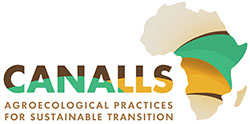The Kabare Living Lab is located north of Bukavu in eastern Democratic Republic of Congo (DRC). With a population exceeding 500,000, the area stretches between Birava and Kabamba at altitudes ranging from 1,400 to 1,700 meters. The mountainous climate provides favorable conditions for agriculture, making it a key farming region.
The main crops cultivated include cassava, maize, sweet potatoes, sorghum, bananas, beans, coffee, tea, and sugarcane. Most of the production is either consumed locally or sold to neighboring towns and villages.
In the Kabare ALL, CANALLS builds upon the work of the “Kivu Specialty Coffee,” “RUNRES,” and “Excellence in Agronomy” projects. Several sustainable agricultural practices have already been implemented, including the use of green manure and biopesticides instead of inorganic inputs. To combat soil erosion, farmers employ ditches and anti-erosion hedges.
The Kabare ALL brings together a diverse range of stakeholders, including farmers, peasant organizations, policymakers, civil society actors, NGOs, government agencies, development organizations, and research institutions to co-create and test agroecological practices.
Key Agroecological Challenges Addressed
During the CANALLS co-creation workshops, several key challenges were identified in Kabare, including:
- Ageing coffee plantations
- Diseases and pests affecting crops
- Inadequate shade management
- Declining soil fertility
- Soil erosion
To tackle these issues, the Living Lab is testing agroecological practices identified through the CANALLS co-creation process. The main practices being evaluated include:
- Nutrient recycling
- Application of waste compost
- Use of biopesticides
- Water retention techniques
- Erosion control measures
These agroecological approaches were selected for their potential to combat soil degradation and common pests in coffee-based systems.

Living Lab Operation & Testing Procedures
Operation
The Kabare ALL is managed through a structured collaboration between IITA, GASD, and UCB, with GASD taking the lead. These organizations combine their expertise to ensure smooth operations, while receiving additional support from partners such as CIRAD, ETH Zürich, and NIBIO.
Trials Progress
Field trials are a crucial step toward the project's success. The first trials began in September 2024, coinciding with the first growing season in Kabare. A total of 11 fields were selected, and trials were effectively set up, following these key steps:
- Identifying suitable fields
- Selecting fields based on criteria defined by scientists and researchers
- Preparing fields for sowing beans (association crop)
- Applying compost and planting anti-erosion hedges
- Introducing biopesticides shortly after planting
- Harvesting beans and planting Mucuna
Long-Term Objectives & Expected Impact

The ALL aims to introduce farmers to agroecological practices, ensuring that they not only adopt these methods during the project but also continue to apply them independently in the future.
Expected Impact
The agroecological practices tested in Kabare are expected to:
- Enhance agricultural productivity while preserving natural resources
- Prevent soil degradation and restore soil nutrients
- Control erosion through sustainable land management techniques
- Manage plant diseases using agroecological solutions
Ultimately, these initiatives will lead to larger production, improved soil health, and a more resilient agricultural system, ensuring a sustainable future for the region.




